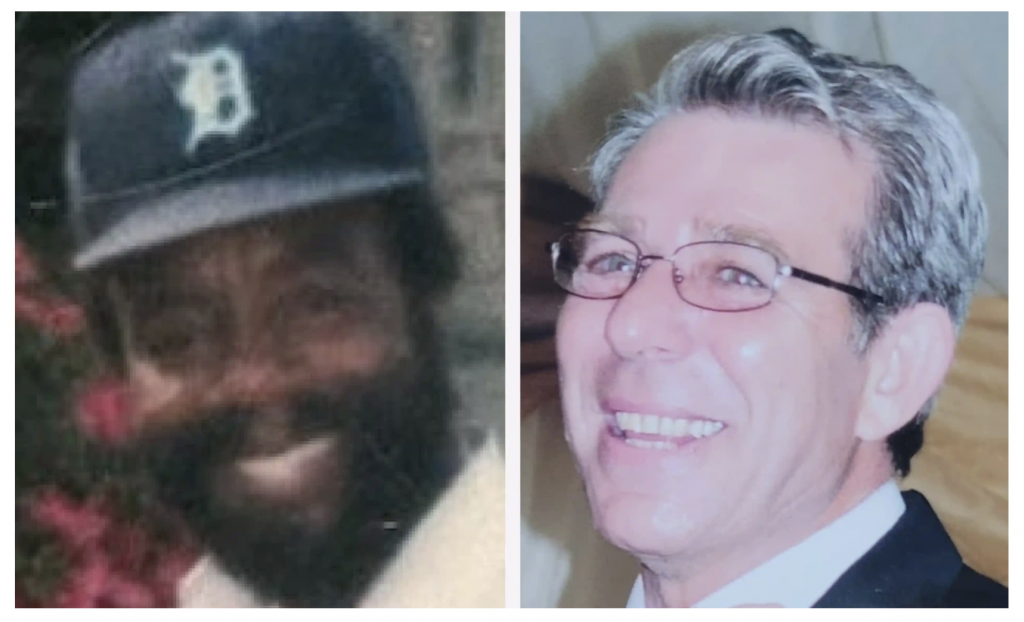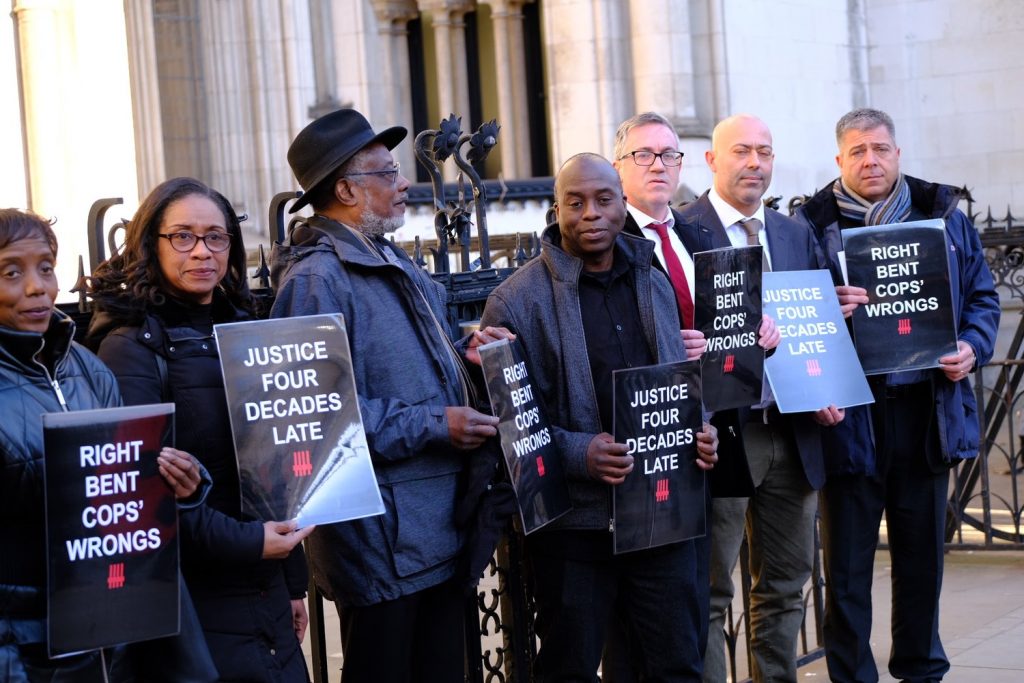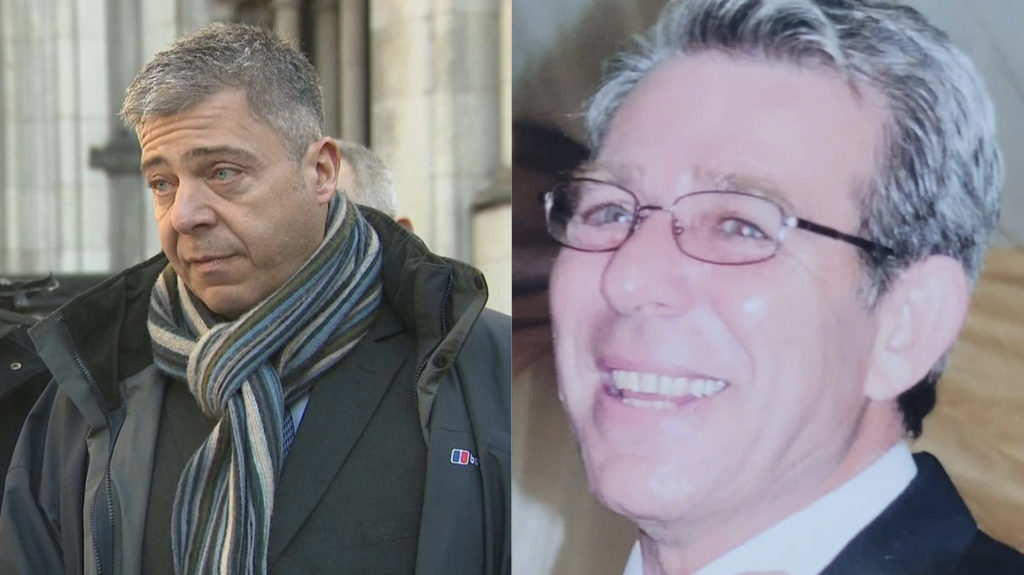A Turkish Cypriot family that fought for nearly fifty years to clear their father’s name after his wrongful imprisonment based on the evidence of a bent copper are still waiting for a direct apology from the British Transport Police and fear lessons have yet to be learned.
In 1977, Saliah Mehmet and his British Rail colleague Basil Peterkin were wrongly convicted of theft and sentenced to nine months in prison after being found guilty of conspiring to steal mailbags worth tens of thousands of pounds from the Bricklayers Arms goods depot in Southwark, south London, where they worked.
The two family-orientated men with unblemished records had been arrested and framed by a corrupt police officer, Detective Sergeant Derek Ridgewell of the British Transport Police (BTP), in November 1975.
Mr Mehmet and Mr Peterkin were among a group of 12 people – 11 of them British Rail employees – who were accused by Ridgewell of re-labelling parcels, so they would be delivered to other addresses and the stolen goods then sold on. Yet it was Ridgewell and other bent coppers who were doing the stealing, and who would plant the evidence on these innocent men.
The 12 stood trial at the Old Bailey in April 1977, and Mr Mehmet and Mr Peterkin were among the eight people subsequently found guilty. By this point Ridgewell was a known liar and racist, yet he had got away with giving false evidence that not only led to the prosecution, conviction and imprisonment of those wrongly accused of stealing from the Bricklayers Arms goods depot, but many other innocent men of foreign (usually African or Caribbean) descent, including those known as the ‘Oval Four’ and ‘Stockwell Six’.
Fate finally caught up with Ridgewell in 1980, when he and two other officers, Detective Constable Douglas Ellis and Detective Constable Alan Keeling, were found guilty of stealing mailbags worth £364,000 from the same Bricklayers Arms goods depot site that Mr Mehmet and Mr Peterkin had worked. All three officers had ‘investigated’ the earlier Bricklayers Arms goods depot thefts – and received praise for it.
Ridgewell, as the ringleader, was jailed for seven years and died in prison two years later aged 37. The other two convicted officers, Ellis and Keeling, received six and two years jail terms respectively.
This development – coming just three years after Mr Mehmet and Mr Peterkin’s conviction – should have sent alarm bells ringing within the force and Crown Prosecution Service about the unreliability of evidence provided by DS Ridgewell and the other bent coppers. Instead, both the BTP and CPS chose to stay silent, failing to inform either man about the corrupt officers’ convictions, leaving Mr Mehmet and Mr Peterkin struggling to prove their innocence while living with the unfair consequences of having a criminal record.
It was only when the Criminal Cases Review Commission (CCRC) intervened and initiated the appeals process in 2022 by contacting Mr Mehmet’s wife Gülser that the family learned of the scale of Ridgewell’s corruption, and the wheels of justice finally started to turn for the two wrongly convicted men.

Sadly, neither gentleman lived to see their convictions quashed by the Court of Appeal last month. Saliah Mehmet died from Covid in 2021, while Basil Peterkin passed away thirty years prior in 1991.
Following a “persistent pro-active investigation” by the CCRC, both men’s cases was sent back to the courts. Neither appeal was uncontested by the CPS. The court heard that Ridgewell was: “dishonest, corrupt, and racist.”
Speaking on behalf of the three judges who heard the appeals case, Lord Justice Holroyde confirmed the two men were innocent, “We cannot turn back the clock. But we can, and do, quash the convictions,” adding that it was “very unfortunate” that the two men “have not lived to learn of their vindication”.
The judge also acknowledged the families’ severe criticism of the BTP, who had failed to sack Ridgewell earlier and prevent him from devastating the lives of Mr Peterkin and Mr Mehmet.
“The BTP have demonstrated they care very little about the victims of Ridgewell”
A statement issued by BTP after the ruling on 18 January 2024 (given in full below) offered a general apology to Ridgewell’s victims and also acknowledged the role of “systemic racism” within the force at the time. However, Mr Mehmet’s family feel this is insufficient and feel bitterly let down by the BTP.
For Mr Mehmet’s eldest son Regu Saliah, who was aged six when his father was jailed, the successful conclusion of their appeal and his father’s full exoneration after 46 years is “a relief”. But he and his family remain angry at the length of time it took and the poor handling of the case by the BTP throughout.
Even when another Ridgewell victim, Stephen Simmons, who had also been framed and wrongly convicted of stealing mailbags from the Bricklayers Arms in 1975, was cleared in 2018, the BTP failed to act.
Devil of the Day:
Derek Ridgewell pic.twitter.com/VoE2v4q1QK— WB (@Treyd03) November 16, 2022
The exoneration of the Oval Four followed in 2019, and again the BTP failed to put forward the cases of Mehmet and Peterkin to the CCRC for review.
“The BTP have demonstrated they care very little about the victims of Ridgewell,” Regu told T-VINE. “First, they promoted him to his position in the Bricklayers Arms, despite the fact he was accused and had clearly demonstrated racist and criminal actions.
“Ridgewell was the subject of a Nationwide documentary in 1973 – his bosses knew what he was capable of. He should have been sacked, but instead he was allowed to remain in a position of power where he continued to victimise families like ours. My mother and I were left penniless and homeless while my father went to jail for a crime he never committed.
“Then, when Ridgewell was convicted of corruption and theft in 1980, the BTP did nothing for his victims. They could have helped to clear my father’s name and give him his life back when he was a relatively young man, but they just left my father to suffer the consequences of his wrongful conviction, a traumatic legacy that stayed with him his whole life.”
“How can they expect us to believe that the racism has been addressed when they don’t identify and acknowledge the victims correctly?”
Regu also hit out at the “crap response” from the BTP in the wake of the Court of Appeal ruling in January and wonders if they have actually learned lessons from his father’s case.
He asks why, given the case involved men from two different ethnic groups, the BTP statement only mentioned and apologised to “British Africans”.
“I think the response from the BTP is totally inadequate. I have no idea who they are addressing it to. The Peterkin family are of Caribbean descent for a start,” said Regu.
“It certainly doesn’t give the impression that they are culturally aware, so how can they expect us to believe that the racism they acknowledged has been addressed when they don’t identify and acknowledge the victims correctly?” he added.
A destroyed life & a destroyed man: the traumatic ordeal of Saliah Mehmet
Regu explains how his father, who had arrived as a young, newly married and confident man in London in 1969, ended up broken and depressed following this miscarriage of justice.
“My father was born in the UK in 1945. Both my parents’ families are actually from Larnaca.
“My paternal grandfather was a Sergeant in the Cyprus Regiment, who fought for Britain in World War II. He was captured and taken to a Prisoner of War camp. After my grandfather was freed [as a PoW], he was brought to the UK, but went back to Cyprus after my dad was born.
“After my dad married my mum, they decided to move to the UK in 1969. My dad worked at British Rail from then until 1977, when he was fitted up and sent to prison. We had been living in Hackney when this happened, not far from the London Bridge depot dad worked at.”
Regu remembers waking up at night when the police came to their home to supposedly look for evidence. At the time, Saliah Mehmet was in police custody and as his wife cared for their young son in one room, Ridgewell was busy planting evidence elsewhere in their home that would be used to convict Mr Mehmet.
Families of victims of corrupt police officer Detective Sergeant Derek Ridgewell demand new law after their convictions posthumously overturned. A scandal that should have been halted 50 years ago. Basil Peterkin & Saliah Mehmet died still ashamed of their wrongful convictions. pic.twitter.com/cJ02UBzI7L
— David Brown (@DavidhBrown) January 18, 2024
As the family’s sole breadwinner, when Mr Mehmet was jailed Regu and his mother were left without any income and became homeless. The family were shunned by fellow Turkish Cypriots, who did not believe Saliah was innocent: “People regarded dad as a criminal, because nobody goes to prison for nothing, right?” states Regu.
Without any family or community support, Regu and his mum were forced to live in unsavoury hostels across East London alongside drug addicts and other undesirables, making life extremely unpleasant for them. These experiences remain a vivid part of Regu’s childhood memories, and they also plagued his father, who felt responsible for allowing his young family to endure such an ordeal.
“The impact of that [wrongful conviction and imprisonment] was a destroyed life and a destroyed man. He was never the same and carried huge guilt for what we had to endure. The sentence that was handed out to him was a sentence for us all,” Regu explains.
“I can remember many occasions stepping over glue sniffers and skinheads to get into a salvation army dorm for the homeless. You can imagine what that would have been like for my mother in her 20s at the time with a kid to care for. I don’t think she slept for 9 months…”
After being released from prison, Regu’s father seemed a shadow of his former confident, sociable self. He became depressed and introverted, and suspicious of everything – especially the police.
“They [the police] were meant to protect us, but instead they lied and lined their own pockets, while framing innocent men like my father,” states Regu. He struggled to get a proper job with a criminal record, so drove minicabs for a living. He ended up working all hours to try to give his family the life he felt they deserved.”
Mrs Mehmet is still alive but finds it too difficult to talk about those harrowing days. She and her husband went on to have two more children, twin boys, who found their father had lost all faith in the system and of ever having his name cleared. Even when he was robbed and beaten as a minicab driver, he refused to go to the police.
“My dad despised what the police did to him, but was also really scared of them. He thought if we pushed for justice, either he or his sons could end up being fitted up by the police again,” states Regu.
#Convictions of two men, Basil Peterkin & Saliah Mehmet quashed today. Lord Justice Holroyde, Vice President of the #CourtofAppeal Criminal Division: “The CCRC has carried out a most thorough investigation for which we are grateful.”https://t.co/0sTGj5s7OI pic.twitter.com/cDuuurcZxZ
— Criminal Cases Review Commission (CCRC) (@ccrcupdate) January 18, 2024
When asked if the family will receive any compensation, Regu responds, “How do you even put a price on such a thing? We were totally focused on clearing my father’s name and to show that he was a victim of that evil man.
“Ridgewell’s actions was so notorious, he came under media scrutiny in ‘73. He was a known liar at that point yet was moved to the depot where he had more autonomy to do what he wanted. It’s terrible that was allowed to occur, not to mention suspicious. No doubt there were many others [bent coppers] involved.”
Urgent changes needed to avoid similar victims of police corruption
Regu fears without urgent changes, others could be vulnerable to a similar miscarriage of justice at the hands of bent coppers. He wants to see an automatic review of convictions triggered where they involve a police officer who is found guilty of criminal actions such as dishonesty and corruption.
“Naturally we are pushing for a change in the law to stop this happening again. Our solicitor is writing to the Lord Chancellor to demand a review,” stated Regu.
Another aspect that has severely upset Saliah Mehmet’s family is the lack of personal contact from the police. After fighting the system for such a long time, the family had expected the BTP to offer them a direct apology for the ordeal they were put through, but a month on from the Court of Appeal verdict, they have yet to hear from the BTP.
When T-VINE quizzed the BTP about this, we were told the Chief Constable Lucy D’Orsi “plans to reach out to the families of those affected in due course.” One wonders what Chief Constable D’Orsi is waiting for?

There is no doubt the family remain deeply scarred by this grotesque miscarriage of justice, although sadly, they are not alone in their experiences. The current Post Office Horizons scandal shows how, even today, hundreds of innocent people can be convicted on flimsy evidence and despite evidence proving their innocence being available, various officials left them to suffer for years without any form of legal redress.
The police too have a history littered with controversy and a culture of corruption. Historic events such as the Battle of Orgreave’, where dozens of miners faced lengthy sentences after being framed for ‘rioting’ in 1984, and the Hillsborough Disaster in 1989, where football fans were accused of being responsible for a fatal human crush that left 97 people dead when it fact it was due to grossly negligent failures by police, are some of the more infamous cases of police behaving with impunity – and getting away with it.
However, as Simon Hatterstone writes for the Guardian, the scale of corruption and lives wreaked by Ridgewell, a single officer, is unprecedented:
“We may never know exactly how many people Ridgewell fitted up in his 15 years as a police officer. What we do know is that there have never been so many convictions overturned – 11 so far – and as many lives torn apart as the result of one corrupt officer.”
The BTP statement following Saliah Mehmet’s and Basil Peterkin’s Appeals Court Ruling
Chief Constable Lucy D’Orsi, said: “As I have commented previously on behalf of the British Transport Police (BTP), I am sincerely sorry for the trauma suffered due to the criminal actions of former police officer DS Derek Ridgewell who worked in BTP during the 1960s and 70s. In particular, it is of regret that we did not act sooner to end his criminalisation which led to the conviction of innocent people, including Mr Peterkin and Mr Mehmet.
“This is simply inexcusable and is something that my colleagues and I are appalled by. The actions of DS Ridgewell do not define the BTP of today which is enriched by highly professional, kind and committed officers and staff who are passionate about protecting the public. I have also met retired officers who are equally appalled by the criminal actions of DS Derek Ridgewell. I acknowledge that, during those times, systemic racism played a role in the culture of the Force, as it did across many parts of society.
“We cannot undo the past, but we can learn from it. This is an important and sombre point of reflection in our history. My colleagues and I are profoundly sorry to all those affected by DS Ridgewell’s atrocious actions and the trauma that victims and their families suffered as a result.
“I would like to reiterate my sincere apology for the trauma caused to the British African community by a corrupt BTP officer, whose misuse of his powers caused harm not only to the innocent young people criminalised, but also to their families and community.
“The identification of DS Ridgewell’s victims has always been important to us and we are thankful that the Criminal Cases Review Commission identified and successfully appealed for justice for Mr Peterkin and Mr Mehmet. We continue to encourage any possible victim or their family to reach out if they feel they have been subject to a miscarriage of justice.”
Main image, top, of the late Saliah Mehmet (right) and his eldest son Regu Saliah speaking outside the Royal Courts of Justice on 18 Jan. 2024 after his father’s theft conviction was finally quashed by the Court of Appeal




